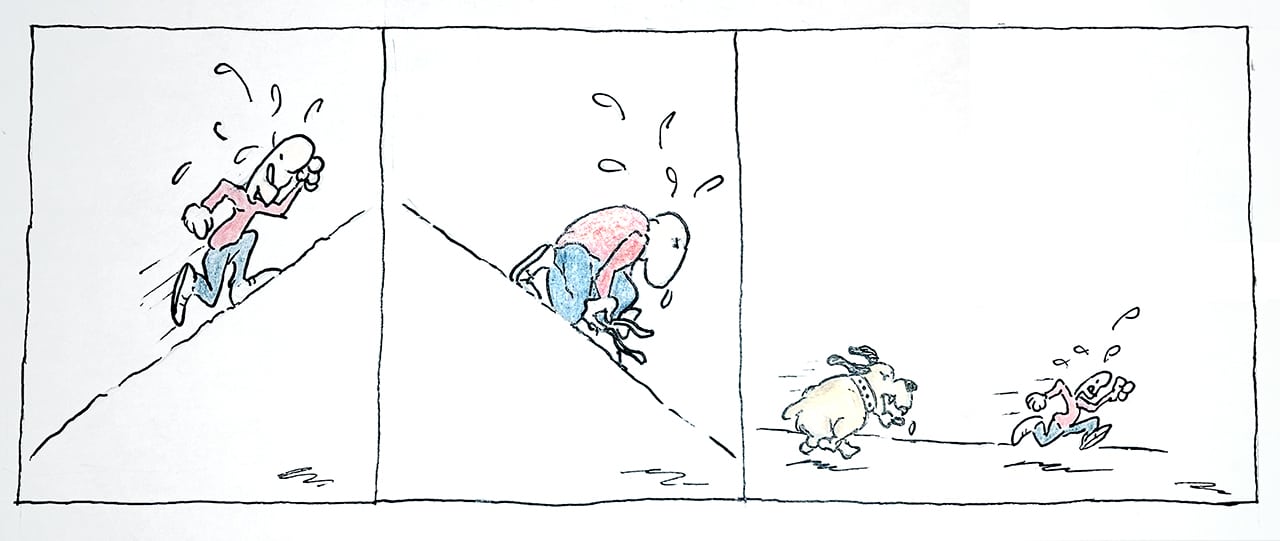The Fine Line Between Conviction and Stubbornness
“It’s like I’ve lost my mojo. Every day I’m questioning my decision to take this position, whether it’s right for me.”
Although not the first client to express a lack of motivation and self-doubt, I was surprised to hear it coming from Dan. Just two months prior, after much careful thought and deliberation, he’d stepped in to a new role which had all the hallmarks of being his dream job.
Over the course of our coaching session, it became apparent that much of the honeymoon shine had worn off his new role and the now-unvarnished reality was looking far less appealing than what he’d envisioned.
Raking his fingers through his hair he demanded, “How could I have been so wrong?
But was this really a case of having made the wrong decision or was there something else at play?

Illustration: Tom Moyer
“Stay Calm,” one of the core principles of Resilient Leadership, is crucial to cultivating and strengthening personal resilience. Without calm as our foundation, we become like emotional corks tossed about on a turbulent sea – reactive rather than responsive, at the mercy of circumstances rather than in command of our choices. In a similar way to how we strengthen our muscles, we can also strengthen our sense of equanimity through practices that increase the tone of the vagus nerve.
The longest nerve in the human body, it regulates bodily functions such as heart rate and breathing through the parasympathetic nervous system. It also influences both our mood and immune response. High vagal tone, which indicates strong activity of the vagus nerve, means a lower resting heart rate, better stress regulation, and a greater capacity for calm. Low vagal tone means the opposite: decreased ability to manage stress and recover from challenges.
Consistent cold exposure (such as ending your morning shower with cold water), deep breathing practices, meditation, singing, and even gargling can strengthen vagal tone over time. These types of practices build your baseline capacity for calm, you might even think of them as deposits in your resilience bank account. Even with regular practice, however, anxiety still strikes in stressful moments.
Going back to my conference experience of pre-session nerves, in those moments while I was hovering outside the door, I knew I needed something immediate. I needed tactics that would work in real-time, without requiring a yoga mat or a meditation app. Following are a few of my favorite, easy-to-remember, and even easier to do anywhere practices:
Breathing Techniques:
- Box Breathing: Inhale for 4, hold for 4, exhale for 4, hold for 4. Used by Navy SEALs and easily done while sitting in meetings.
- Extended Exhale: Make your exhale longer than your inhale (try 4 in, 6 out). This immediately signals safety to your nervous system.
Physical Reset Techniques:
- Progressive Muscle Release: Clench your fists tightly for 5 seconds, then release completely. Notice the contrast and let that relaxation spread.
- Shoulder Blade Squeezes: Pull your shoulder blades together and hold for 5 seconds, then release. Helps counter the physical tension of stress
Cognitive Techniques:
- The 10-10-10 Rule: Will this matter in 10 minutes? 10 months? 10 years? Puts immediate stress in perspective.
- Compassionate Self-Talk: Ask yourself, "What would I tell my best friend in this situation?" Then offer yourself that same kindness.
Standing outside that conference room, I decided to try to the extended exhale technique; a simple 4 counts in, 6 counts out. After just three cycles, my shoulders had dropped and my breathing had steadied. I walked in centered, present, and ready.
The session went smoothly, but more importantly, I had proven to myself yet again that calm isn't a state that we simply will into being, but it is something that we can develop and tap into when we need it most. While none of these techniques will eliminate stress, they do give us tools to navigate it with intention. In leadership and in life, having the ability to stay (or to find) calm in challenging moments can often determine not only our own success, but also the confidence and composure of everyone around us.

Eileen Wiediger, Certified Resilient Leadership Coach
Eileen is an ICF-certified coach who empowers individuals at all levels to navigate the dynamic journey from self-awareness to self-transcendence. She has worked as a strategist, instructional designer, and facilitator solving complex problems and creating systems for learning and growth. You can reach her at: https://www.linkedin.com/in/a-eileen-wiediger/ or through her website: https://www.steeproad.com.
